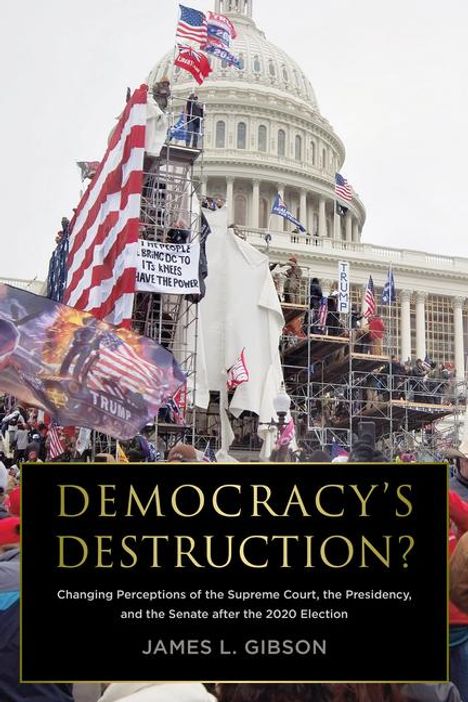James L Gibson: Democracy's Destruction? Changing Perceptions of the Supreme Court, the Presidency, and the..., Kartoniert / Broschiert
Democracy's Destruction? Changing Perceptions of the Supreme Court, the Presidency, and the Senate After the 2020 Election
- Changing Perceptions of the Supreme Court, the Presidency, and the Senate After the 2020 Election
(soweit verfügbar beim Lieferanten)
- Verlag:
- Russell Sage Foundation, 09/2024
- Einband:
- Kartoniert / Broschiert
- Sprache:
- Englisch
- ISBN-13:
- 9780871548658
- Artikelnummer:
- 11754189
- Umfang:
- 260 Seiten
- Gewicht:
- 454 g
- Maße:
- 229 x 152 mm
- Stärke:
- 23 mm
- Erscheinungstermin:
- 30.9.2024
- Hinweis
-
Achtung: Artikel ist nicht in deutscher Sprache!
Klappentext
On January 6, 2021, an angry mob stormed the U. S. Capitol in an attempt to overturn the results of the 2020 presidential election. This assault on America's democratic system was orchestrated by then President Donald Trump, abetted by his political party, and supported by a vocal minority of the American people. Did denial of the election results and the subsequent insurrection inflict damage on American political institutions? While most pundits and many scholars say yes, they have offered little rigorous evidence for this assertion. In *Democracy's Destruction?*political scientist James L. Gibson uses surveys from representative samples of the American population to provide a more informed answer to the question.
Focusing on the U. S. Supreme Court, the presidency, and the U. S. Senate, Gibson reveals that how people assessed the election, the insurrection, and even the second Trump impeachment has little connection to their willingness to view American political institutions as legitimate. Instead, legitimacy is grounded in more general commitments to democratic values and support for the rule of law. On most issues of institutional legitimacy, those who denied the election results and supported the insurrection were not more likely to be alienated from political institutions and to consider them illegitimate.
Gibson also investigates whether Black people might have responded differently to the events of the 2020 election and its aftermath. He finds that in comparison to the White majority, Black Americans were less supportive of America's democratic institutions and of democratic values, such as reverence for the rule of law, because they often have directly experienced unfair treatment by legal authorities. But he emphasizes that the actions of Trump and his followers are not the cause of those weaker commitments.
Democracy's Destruction? offers rigorous analysis of the effect of the Trump insurrection on the state of U. S. democracy today. While cautioning that Trump and many Republicans may be devising schemes to subvert the next presidential election more effectively, the book attests to the remarkable endurance of American political institutions.

